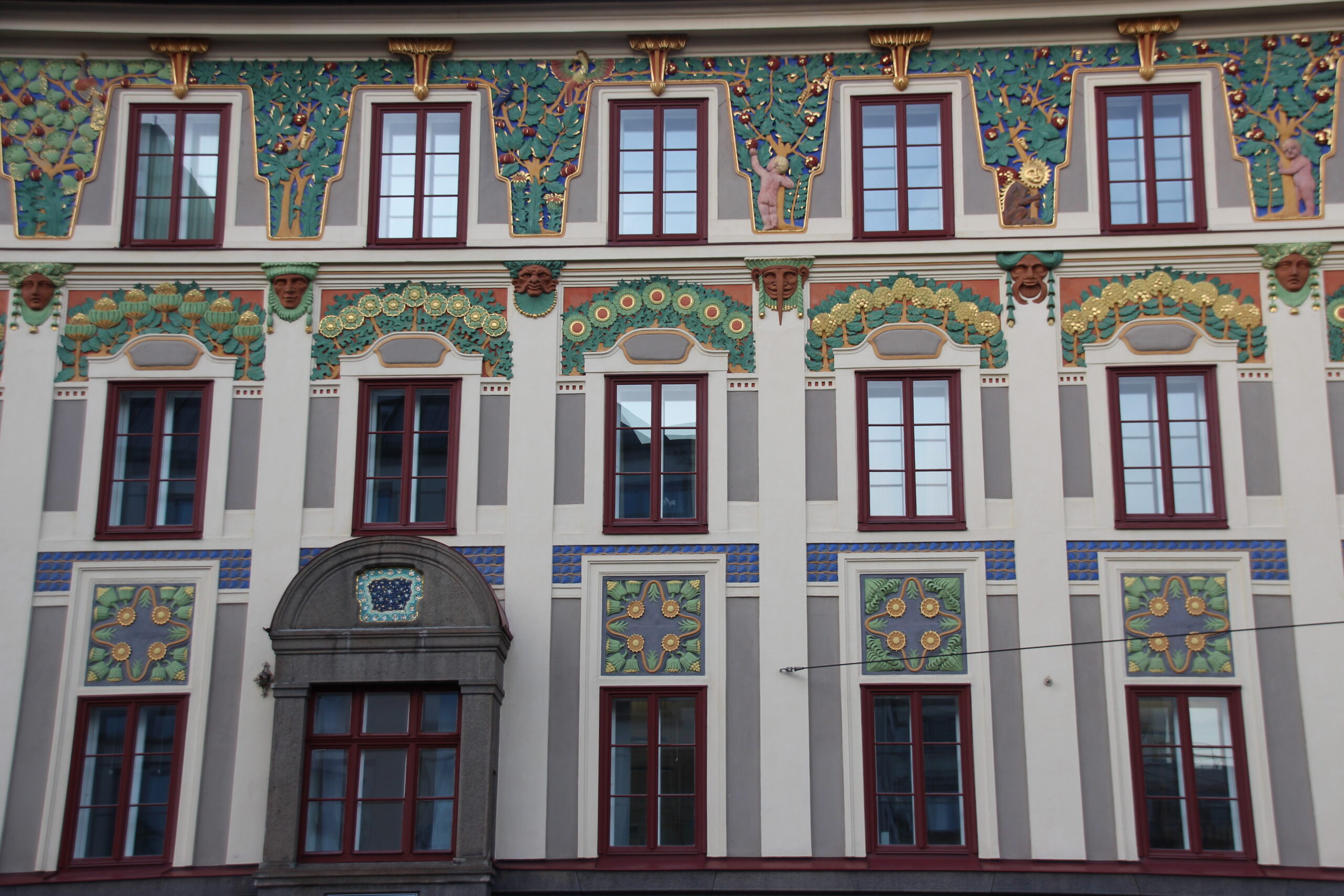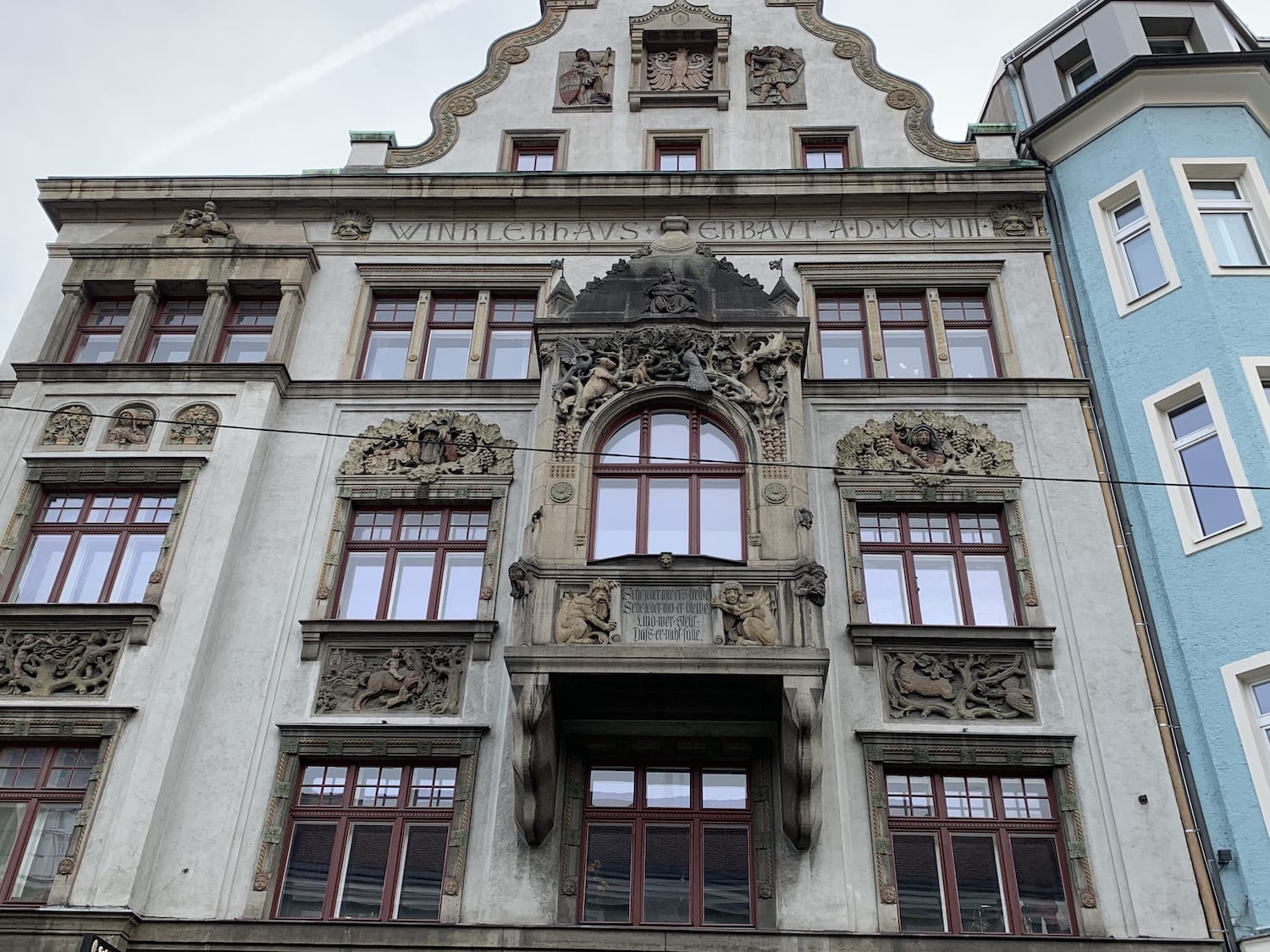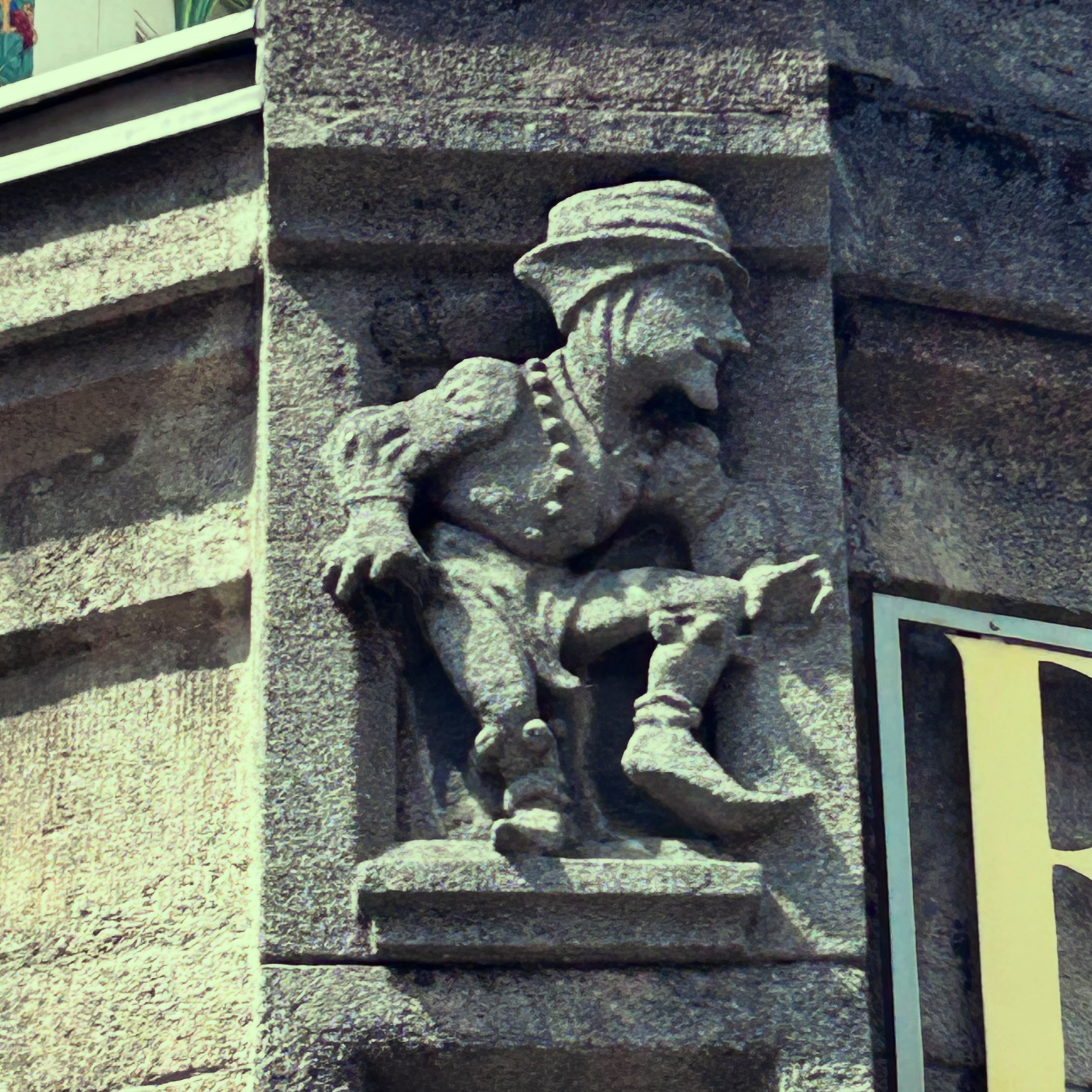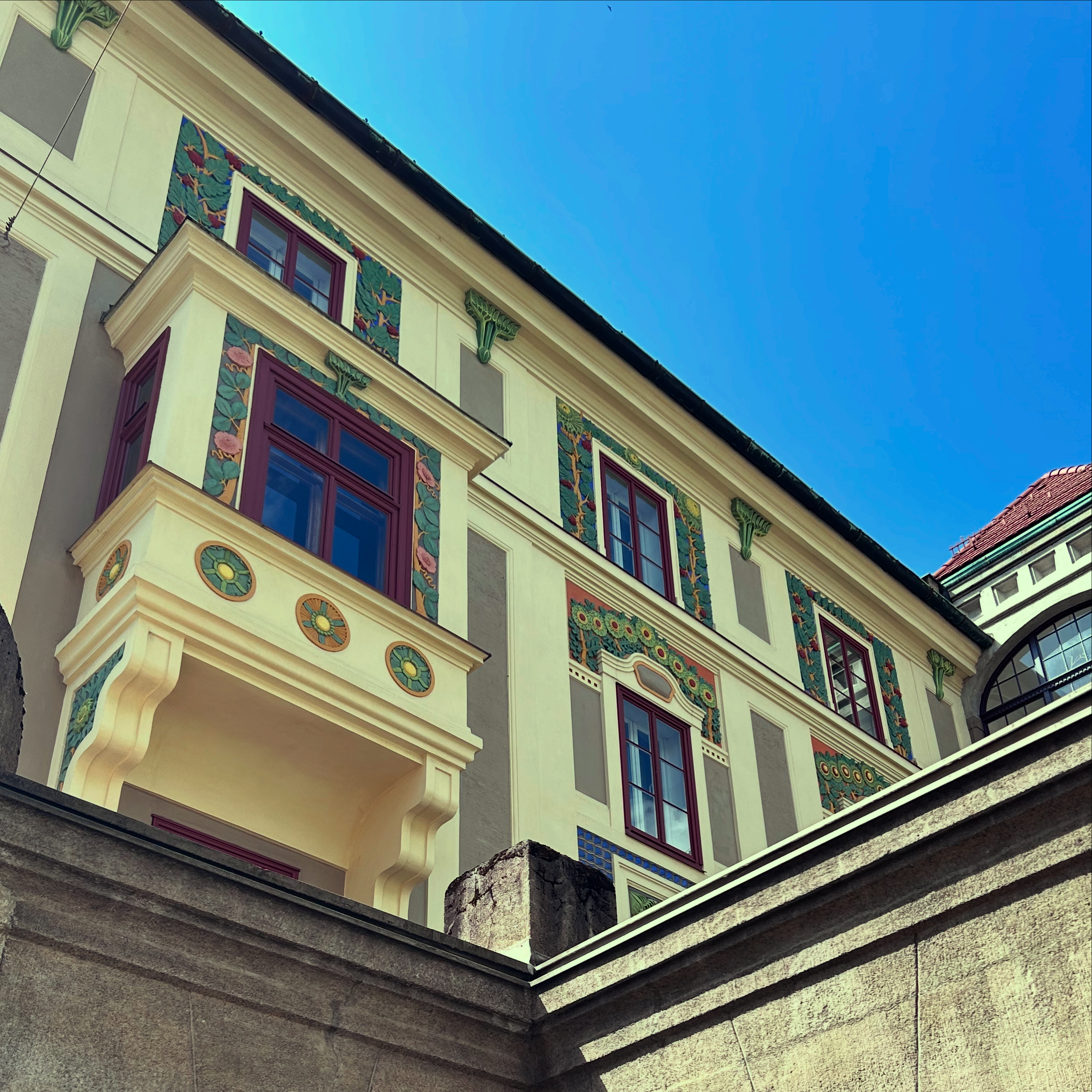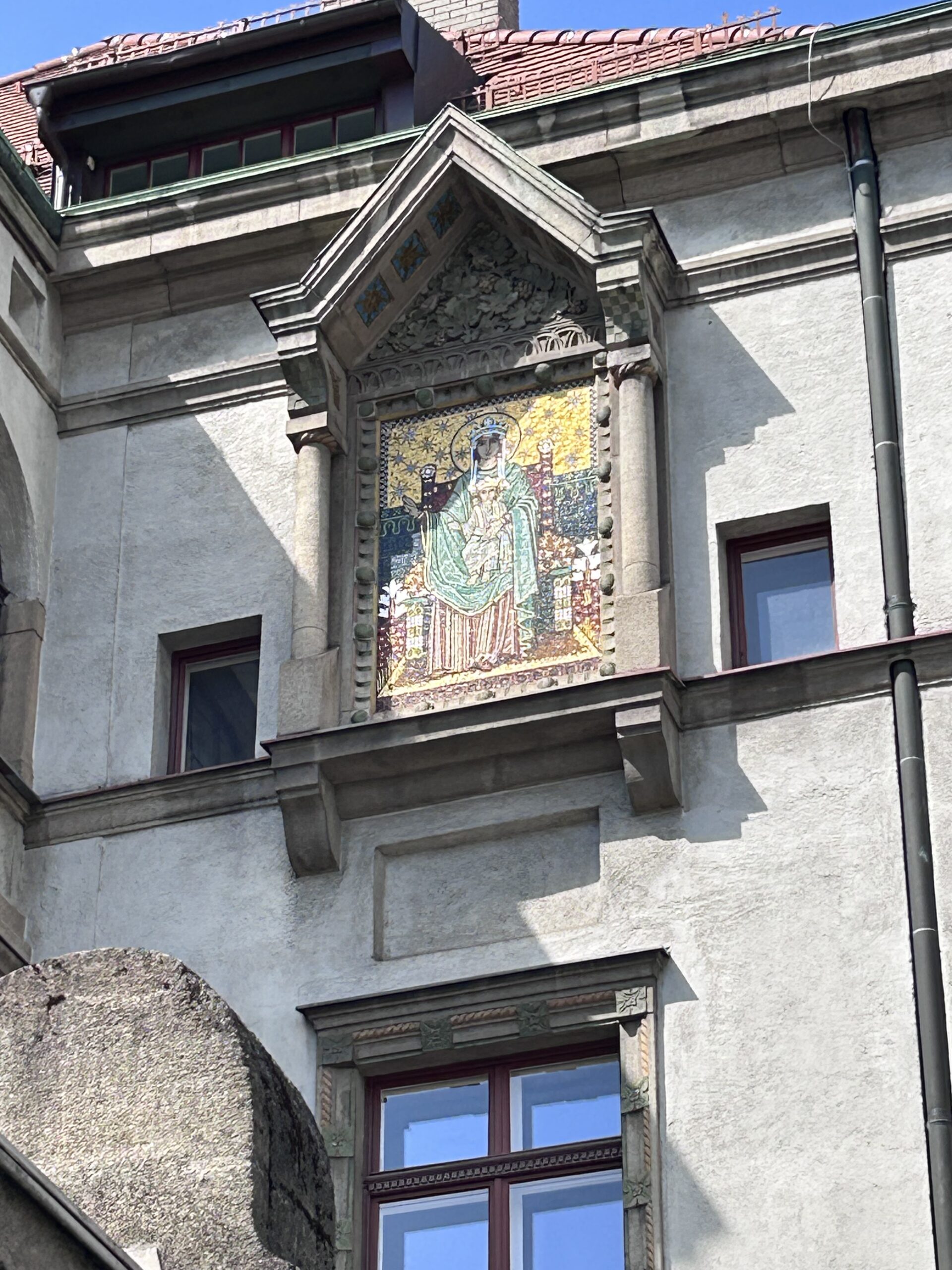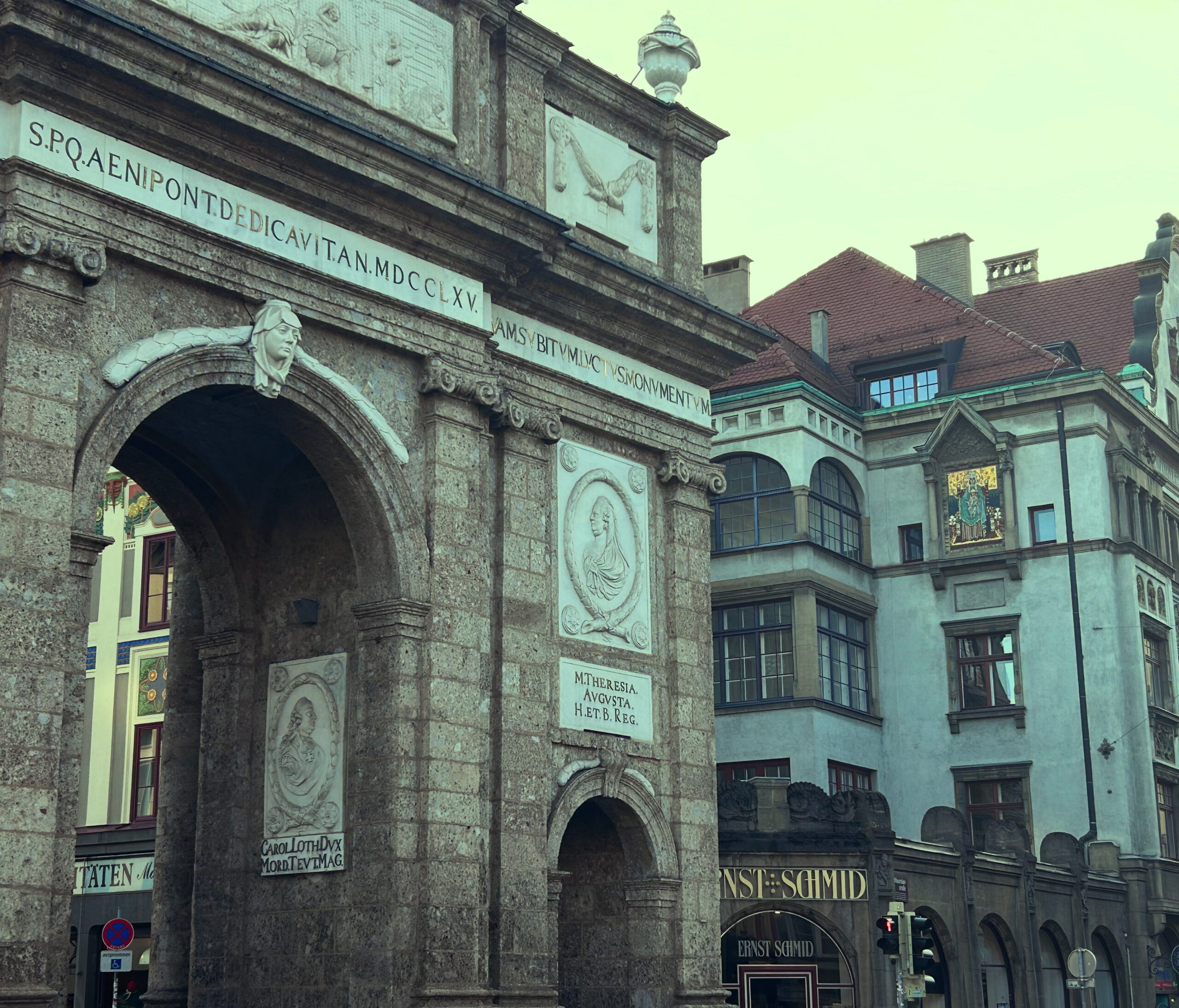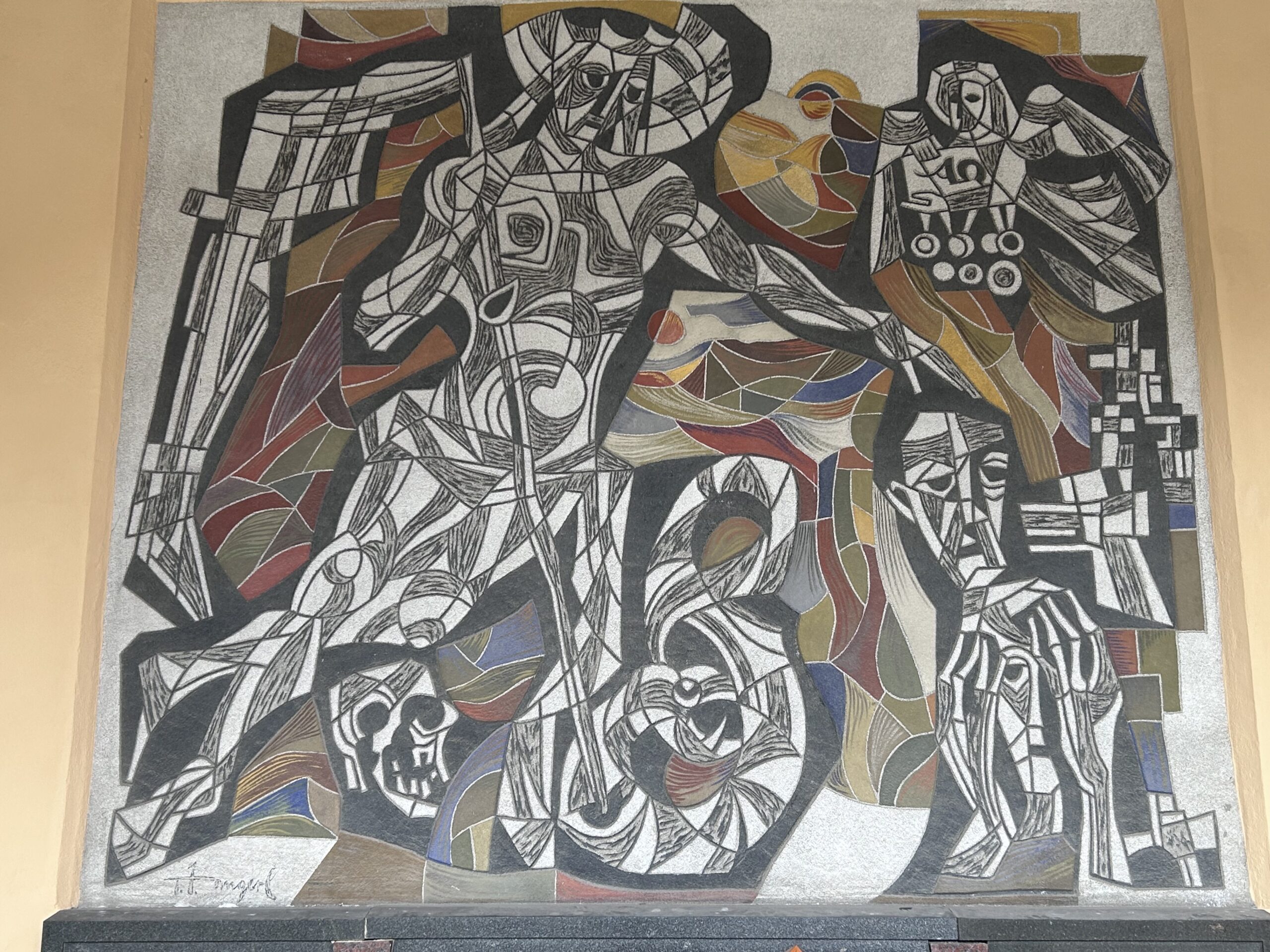Winklerhaus
Corner of Leopoldstraße/Maximilianstraße
Worth knowing
The Winklerhaus right next to the Triumphpforte and in the middle of the city traffic, often remains hidden from the eyes of inattentive walkers. Wrongly so, as it is one of the few Art Nouveau buildings in Innsbruck. The two parts of the building, consisting of a commercial wing in Leopoldstraße and a residential wing in Maximilianstraße, stand out clearly from the rest of the surrounding architecture. The Innsbruck city pharmacist Franz Winkler (1833 - 1895) had the building extended to its current height in 1873. His successor as landlord and Innsbruck lawyer Josef Winkler hired the Munich architect Anton Bachmann to replace the classicist façade with the current Art Nouveau façade.
From Leopoldstraße, you can admire the façade with its rich and sweeping ornamentation. The animals, mythical creatures and masks on the capitals are typical of the playful Art Nouveau style. In the frieze zone above the shop wing is a mosaic of a Byzantine Madonna, an extremely unusual depiction of the Virgin Mary for Innsbruck. Instead of the suffering Mother of God, it shows precious stone jewellery and rich headdresses. Above the entrance to the shop on the ground floor, morris dancers are contorting their limbs, a reminiscence by the artist of Innsbruck's city history. This courtly dance from the time of Maximilian was also captured for posterity in sculptural form on the Golden Roof.
The part of the Winklerhaus in Maximilianstraße is less colourful, but no less worth seeing. The bay window decorated with two mythical creatures in particular is evidence of an imaginative and creative builder:
"Let each man do as he pleases,
Let everyone see where they stay,
And who stands,
that he does not fall."
Art Nouveau was an expression of a new bourgeois self-image around the turn of the century. It was a kind of rebellion against traditional values, which the aristocracy still embodied despite the changes after 1848, especially in the Austrian monarchy. Enlightened citizens increasingly saw themselves as individuals outside of Catholic-orientated hierarchies and the new technocracy. Sensuality and nature against rationality and class thinking, body awareness as a sign of a new era. Life reformers abhorred the new synchronisation of time and having to submit to the galloping technologisation and rationality in every respect. Man, body, mind and soul in connection with nature were to take centre stage. Art Nouveau as an art movement was based on this trend. Similar to Romanticism in the 18th and 19th centuries, a form of mysticism away from structured and sober reality was to return to life. The splendour hinted at a new, better time, a golden age. The clear forms of classicism and the pure reason it represented were to be overcome by the playfulness of Art Nouveau.
The Winklerhaus represents a contrast to the majority of buildings erected in Innsbruck around 1900. This becomes clear when you look at the architecture of the Winklerhaus with the austere main post office in Maximilianstraße opposite, which was planned in the typical style of the k.uk. The building was planned in 1908. Unlike in Vienna, where Art Nouveau by artists such as Otto Wagner and Gustav Klimt began its triumphal march, this style never really caught on in Tyrol. Town pharmacist Franz Winkler, on the other hand, was open to modern art not only in his choice of residence, but also in the design of his final resting place. An expressive modernist, cubist painting adorns the Winkler family tomb in the arcades of the Westfriedhof cemetery in Wilten.
Life reform and social democracy
„Light air and sun“ was the motto of the Lebensreform, a collective movement of alternative lifestyles that began in Germany in the late 19th century in step with the development of social democracy. Both movements were reactions to the living conditions in the rapidly growing cities. Urbanisation was increasingly perceived as a burden by more and more people. Although many of the workers and employees in Innsbruck had more resources at their disposal in absolute terms than ever before, the pressure to participate in society was also increasing. From the 1890s, there were several advertising pillars in Innsbruck on which artistically designed posters advertised the new variety of products. Department stores and fashion outlets made the differences within the differentiating society more visible than ever before. Anyone who wanted to keep up with the new bourgeois class had to be able to afford luxury goods such as coffee. At the same time, the burden of industrialisation increased. The traffic on the roads, the exhaust fumes from the factories, the cramped living conditions in the rented barracks and the hitherto unknown haste caused by the clocking of time, which made new illnesses such as neurasthenia acceptable, provoked counter-movements. Although Innsbruck was not comparable to Paris or London in terms of the size or intensity of industrialisation, the fall from grace for many inhabitants of the former rural villages such as Pradl and the workers who had moved in from the countryside was enormous.
Since 1869 the German Quarterly Journal for Public Health Care, which focussed on improving nutrition, hygiene and living space. In 1881 the Austrian Society for Healthcare was founded. Private associations organised educational events on clean and healthy living. There was political lobbying for the construction of parks in public spaces and the improvement of infrastructure such as baths, hospitals, sewage systems and water pipes. Assanation and social hygiene were the buzzwords of a bourgeois elite concerned about their fellow human beings and public health. Instead of the socialist revolution, the Christian idea of charity was to advance society. Like all elitist movements, the life reform took on some absurd forms. Movements such as vegetarianism, nudism, garden cities, various esoteric movements and other alternative lifestyles, which have survived in one form or another to this day, emerged during this period. Spiritualism also enjoyed a happy existence in the upper class alongside the dogmas of the Catholic Church. This often well-meaning but eccentric lifestyle of the wealthy bourgeoisie in their villas in Saggen, Wilten and Pradl was usually denied to workers. Many tenement blocks were dreary and overcrowded biotopes with no infrastructure such as sports facilities or parks. It was the early social democrats who took a political stand against the realities of workers' lives. Modern housing estates should be functional, comfortable, affordable and connected with green spaces. These views also prevailed in public authorities. Albert Gruber, professor at the Innsbruck Trade School, wrote in 1907:
"I've often heard people say that we don't need plants in Innsbruck, that nature provides us with everything, but that's not true. What could be nicer than when professionals can walk from their place of work to their home through a series of plants. It turns the journey to and from work into a relaxing walk. Incidentally, there are many reasons why planting trees and gardens in urban areas is beneficial. I do not want to emphasise the interaction between people and plants, which is probably well known. In another way, plants improve the air we breathe by reducing dust."
Even before the First World War, there were changes in everyday politics. Social democracy as a political movement had officially existed as a political party since 1889, but under the Habsburg monarchy it only had very limited opportunities to organise. Socialism was considered unchristian and was viewed with suspicion in the Holy Land of Tyrol. The labour movement was important as a social counterweight to the Catholic structures in the larger cities, which dominated everything in Tyrol. In 1865, the first Tyrolean Labour Education Association. Workers should become aware of their position within society before the impending world revolution. To achieve this, it was essential to have a minimum level of education and to be able to read and write. 10 years later, Franz Reisch founded the General Workers“ Association in Innsbruck. Another two years later, the „Allgemeine Arbeiter-, Kranken-, und Invaliden-Casse“ (General Workers', Sickness and Invalids' Fund) was launched throughout the empire. Despite state repression, the "radicals" continued to hold large gatherings. From 1893, the social democratic Volkszeitung was published in Innsbruck as a counter-voice to the Catholic papers. In 1899, the First Tyrolean Workers' Bakery, or ETAB for short, was opened in what is now Maximilianstraße. The co-operative set itself the goal of producing high-quality bread at fair prices under good working and hygiene conditions. After several relocations, the ETAB ended up in Hallerstraße, where it produced fresh baked goods every day until 1999.
The first free elections within the Austro-Hungarian Monarchy to the Imperial Council for all male citizens in 1907 changed not only the political but also the social balance of power. Monarchy to the Imperial Council for all male citizens in 1907 changed not only the political but also the social balance of power. The Pofl now had a political say. Important laws such as restrictions on working hours and improvements in working conditions could now be demanded with greater vigour. Together with Upper Austria, the crown land of Tyrol had the longest working hours in the entire Danube Monarchy. Although the number of trade union members also increased, outside of the small town centres Tyrol was too rural to generate any significant pressure. At municipal level, the census electoral law, which had given Greater German liberal and conservative clerical politicians a free pass to power for decades, remained in place until after the war. Even after the first municipal council elections after 1918, the fulfilment of the resulting demands had to wait.
Josef Prachensky (1861 - 1931), the father of architect and town planner Theodor Prachensky, was a well-known Innsbruck representative of the Lebensreform and social democracy. He grew up in German-speaking Bohemia, then part of the Austro-Hungarian Empire. As a trained book printer, he discovered the labour movement during his wanderings in Vienna during the book printers„ strike. After marrying a Tyrolean woman, he settled in Innsbruck, where he worked as an editor for the social democratic Volkszeitung for Tyrol and Vorarlberg. Josef Prachensky supported the Workers“ Consumption Association, the Tyrolean Workers' Bakery and founded the catering business "Alkoholfrei" in Museumstraße, which aimed to improve general health in the spirit of the life reform movement and socialism. Friedrich Engels (1820 - 1895), the co-author of the Communist Manifesto, had already recognised schnapps and brandy as an evil of the working class in the first half of the 19th century. Socialism shared the goal of getting people away from alcohol with church organisations. The world revolution was no more feasible with addicts than a virtuous, God-pleasing life. Prachensky was involved in the founding of the Tyrolean Social Democratic Party in 1890 and, after the First World War, in the founding of the Tyrolean Republican Protection League RESCH, the left-wing counterpart to the right-wing home defence associations. A particular political concern of his was the restriction of the church to school education, which was still very important in the 19th and early 20th century, even in the actually liberal Innsbruck, which had to adhere to the national school regulations.
Life reform and the growing influence of social democracy also influenced art and architecture. People wanted to distance themselves from what Max Weber described as the Protestant ethic, industry, time clocks and, in general, rapid technological progress with all its effects on people and the social fabric. People as individuals, not their economic performance, should once again take centre stage. The culture of the old society, in which the nobility and clergy stood above the rest of society, was to be overcome. What social democracy was to the workers, art and architecture were to the upper middle classes. Art Nouveau was the artistic response of an eccentric and alternative part of the bourgeoisie to this return to the origins of the turn of the century. The playful element was the opposite of the always symmetrical and tidy historicism. The Winklerhaus in Wilten is one of the few examples of Art Nouveau in Innsbruck.
The year 1848 and its consequences
The year 1848 occupies a mythical place in European history. Although the hotspots were not to be found in secluded Tyrol, but in the major metropolises such as Paris, Vienna, Budapest, Milan and Berlin, even in the Holy Land however, the revolutionary year left its mark. In contrast to the rural surroundings, an enlightened educated middle class had developed in Innsbruck. Enlightened people no longer wanted to be subjects of a monarch or sovereign, but citizens with rights and duties towards the state. Students and freelancers demanded political participation, freedom of the press and civil rights. Workers demanded better wages and working conditions. Radical liberals and nationalists in particular even questioned the omnipotence of the church.
In March 1848, this socially and politically highly explosive mixture erupted in riots in many European cities. In Innsbruck, students and professors celebrated the newly enacted freedom of the press with a torchlight procession. On the whole, however, the revolution proceeded calmly in the leisurely Tyrol. It would be foolhardy to speak of a spontaneous outburst of emotion; the date of the procession was postponed from 20 to 21 March due to bad weather. There were hardly any anti-Habsburg riots or attacks; a stray stone thrown into a Jesuit window was one of the highlights of the Alpine version of the 1848 revolution. The students even helped the city magistrate to monitor public order in order to show their gratitude to the monarch for the newly granted freedoms and their loyalty.
The initial enthusiasm for bourgeois revolution was quickly replaced by German nationalist, patriotic fervour in Innsbruck. On 6 April 1848, the German flag was waved by the governor of Tyrol during a ceremonial procession. A German flag was also raised on the city tower. Tricolour was hoisted. While students, workers, liberal-nationalist-minded citizens, republicans, supporters of a constitutional monarchy and Catholic conservatives disagreed on social issues such as freedom of the press, they shared a dislike of the Italian independence movement that had spread from Piedmont and Milan to northern Italy. Innsbruck students and marksmen marched to Trentino with the support of the k.k. The Innsbruck students and riflemen moved into Trentino to nip the unrest and uprisings in the bud. Well-known members of this corps were Father Haspinger, who had already fought with Andreas Hofer in 1809, and Adolf Pichler. Johann Nepomuk Mahl-Schedl, wealthy owner of Büchsenhausen Castle, even equipped his own company with which he marched across the Brenner Pass to secure the border.
The city of Innsbruck, as the political and economic centre of the multinational crown land of Tyrol and home to many Italian speakers, also became the arena of this nationality conflict. Combined with copious amounts of alcohol, anti-Italian sentiment in Innsbruck posed more of a threat to public order than civil liberties. A quarrel between a German-speaking craftsman and an Italian-speaking Ladin got so heated that it almost led to a pogrom against the numerous businesses and restaurants owned by Italian-speaking Tyroleans.
The relative tranquillity of Innsbruck suited the imperial house, which was under pressure. When things did not stop boiling in Vienna even after March, Emperor Ferdinand fled to Tyrol in May. According to press reports from this time, he was received enthusiastically by the population.
"Wie heißt das Land, dem solche Ehre zu Theil wird, wer ist das Volk, das ein solches Vertrauen genießt in dieser verhängnißvollen Zeit? Stützt sich die Ruhe und Sicherheit hier bloß auf die Sage aus alter Zeit, oder liegt auch in der Gegenwart ein Grund, auf dem man bauen kann, den der Wind nicht weg bläst, und der Sturm nicht erschüttert? Dieses Alipenland heißt Tirol, gefällts dir wohl? Ja, das tirolische Volk allein bewährt in der Mitte des aufgewühlten Europa die Ehrfurcht und Treue, den Muth und die Kraft für sein angestammtes Regentenhaus, während ringsum Auflehnung, Widerspruch. Trotz und Forderung, häufig sogar Aufruhr und Umsturz toben; Tirol allein hält fest ohne Wanken an Sitte und Gehorsam, auf Religion, Wahrheit und Recht, während anderwärts die Frechheit und Lüge, der Wahnsinn und die Leidenschaften herrschen anstatt folgen wollen. Und während im großen Kaiserreiche sich die Bande überall lockern, oder gar zu lösen drohen; wo die Willkühr, von den Begierden getrieben, Gesetze umstürzt, offenen Aufruhr predigt, täglich mit neuen Forderungen losgeht; eigenmächtig ephemere- wie das Wetter wechselnde Einrichtungen schafft; während Wien, die alte sonst so friedliche Kaiserstadt, sich von der erhitzten Phantasie der Jugend lenken und gängeln läßt, und die Räthe des Reichs auf eine schmähliche Weise behandelt, nach Laune beliebig, und mit jakobinischer Anmaßung, über alle Provinzen verfügend, absetzt und anstellt, ja sogar ohne Ehrfurcht, den Kaiaer mit Sturm-Petitionen verfolgt; während jetzt von allen Seiten her Deputationen mit Ergebenheits-Addressen mit Bittgesuchen und Loyalitätsversicherungen dem Kaiser nach Innsbruck folgen, steht Tirol ganz ruhig, gleich einer stillen Insel, mitten im brausenden Meeressturme, und des kleinen Völkchens treue Brust bildet, wie seine Berge und Felsen, eine feste Mauer in Gesetz und Ordnung, für den Kaiser und das Vaterland."
In June, a young Franz Josef, not yet emperor at the time, also stayed at the Hofburg on his way back from the battlefields of northern Italy instead of travelling directly to Vienna. Innsbruck was once again the royal seat, if only for one summer. While blood was flowing in Vienna, Milan and Budapest, the imperial family enjoyed life in the Tyrolean countryside. Ferdinand, Franz Karl, his wife Sophie and Franz Josef received guests from foreign royal courts and were chauffeured in four-in-hand carriages to the region's excursion destinations such as Weiherburg Castle, Stefansbrücke Bridge, Kranebitten and high up to Heiligwasser. A little later, however, the cosy atmosphere came to an end. Under gentle pressure, Ferdinand, who was no longer considered fit for office, passed the torch of regency to Franz Josef I. In July 1848, the first parliamentary session was held in the Court Riding School in Vienna. The first constitution was enacted. However, the monarchy's desire for reform quickly waned. The new parliament was an imperial council, it could not pass any binding laws, the emperor never attended it during his lifetime and did not understand why the Danube Monarchy, as a divinely appointed monarchy, needed this council.
Nevertheless, the liberalisation that had been gently set in motion took its course in the cities. Innsbruck was given the status of a town with its own statute. Innsbruck's municipal law provided for a right of citizenship that was linked to ownership or the payment of taxes, but legally guaranteed certain rights to members of the community. Birthright citizenship could be acquired by birth, marriage or extraordinary conferment and at least gave male adults the right to vote at municipal level. If you got into financial difficulties, you had the right to basic support from the town.
Thanks to the census-based majority voting system, the Greater German liberal faction prevailed within the city government, in which merchants, tradesmen, industrialists and innkeepers set the tone. On 2 June 1848, the first edition of the liberal and Greater German-minded Innsbrucker Zeitungfrom which the above article on the emperor's arrival in Innsbruck is taken. Conservatives, on the other hand, read the Volksblatt for Tyrol and Vorarlberg. Moderate readers who favoured a constitutional monarchy preferred to consume the Bothen for Tyrol and Vorarlberg. However, the freedom of the press soon came to an end. The previously abolished censorship was reintroduced in parts. Newspaper publishers had to undergo some harassment by the authorities. Newspapers were not allowed to write against the state government, monarchy or church.
"Anyone who, by means of printed matter, incites, instigates or attempts to incite others to take action which would bring about the violent separation of a part from the unified state... of the Austrian Empire... or the general Austrian Imperial Diet or the provincial assemblies of the individual crown lands.... Imperial Diet or the Diet of the individual Crown Lands... violently disrupts... shall be punished with severe imprisonment of two to ten years."
After Innsbruck officially replaced Meran as the provincial capital in 1849 and thus finally became the political centre of Tyrol, political parties were formed. From 1868, the liberal and Greater German orientated party provided the mayor of the city of Innsbruck. The influence of the church declined in Innsbruck in contrast to the surrounding communities. Individualism, capitalism, nationalism and consumerism stepped into the breach. New worlds of work, department stores, theatres, cafés and dance halls did not supplant religion in the city either, but the emphasis changed as a result of the civil liberties won in 1848.
Perhaps the most important change to the law was the Basic relief patent. In Innsbruck, the clergy, above all Wilten Abbey, held a large proportion of the peasant land. The church and nobility were not subject to taxation. In 1848/49, manorial rule and servitude were abolished in Austria. Land rents, tithes and roboters were thus abolished. The landlords received one third of the value of their land from the state as part of the land relief, one third was regarded as tax relief and the farmers had to pay one third of the relief themselves. They could pay off this amount in instalments over a period of twenty years.
The after-effects can still be felt today. The descendants of the then successful farmers enjoy the fruits of prosperity through inherited land ownership, which can be traced back to the land relief of 1848, as well as political influence through land sales for housing construction, leases and public sector redemptions for infrastructure projects. The land-owning nobles of the past had to resign themselves to the ignominy of pursuing middle-class labour. The transition from birthright to privileged status within society was often successful thanks to financial means, networks and education. Many of Innsbruck's academic dynasties began in the decades after 1848.
Das bis dato unbekannte Phänomen der Freizeit kam, wenn auch für den größten Teil nur spärlich, auf und begünstigte gemeinsam mit frei verfügbarem Einkommen einer größeren Anzahl an Menschen Hobbies. Zivile Organisationen und Vereine, vom Lesezirkel über Sängerbünde, Feuerwehren und Sportvereine, gründeten sich. Auch im Stadtbild manifestierte sich das Revolutionsjahr. Parks wie der Englische Garten beim Schloss Ambras oder der Hofgarten waren nicht mehr exklusiv der Aristokratie vorbehalten, sondern dienten den Bürgern als Naherholungsgebiete vom beengten Dasein. In St. Nikolaus entstand der Waltherpark als kleine Ruheoase. Einen Stock höher eröffnete im Schloss Büchsenhausen Tirols erste Schwimm- und Badeanstalt, wenig später folgte ein weiteres Bad in Dreiheiligen. Ausflugsgasthöfe rund um Innsbruck florierten. Neben den gehobenen Restaurants und Hotels entstand eine Szene aus Gastwirtschaften, in denen sich auch Arbeiter und Angestellte gemütliche Abende bei Theater, Musik und Tanz leisten konnten.
The success story of the Innsbruck glass painters
In the pre-war period, the United States of America was regarded as the Land of unlimited possibilitieswhere dishwashers became millionaires. However, these success stories are not an exclusive phenomenon of the New World. Even in the society of the Danube Monarchy, which was not yet regulated down to the last detail, hard-working and capable people from the farming classes, the working classes or craftsmen were able to achieve astonishing success without formal training, qualification examinations or state authorisation. The three founders of the Tyrolean Glass Painting and Mosaic Institute, Josef von Stadl, Georg Mader and Albert Neuhauser, are examples of such a success story from Innsbruck's city history. While most of Innsbruck's industrial and craft businesses focussed on supplying the local market with tried and tested, solid products and consumer goods, the glass painting business was one of the few innovative and export-oriented companies of its time.
Josef von Stadl (1828 - 1893) grew up on his parents' farm and inn in Steinach am Brenner. Even as a child, he had to help out on the farm. The hard labour gave him periostitis in his arm at the age of nine. This made heavy physical labour impossible for him. Instead, the boy with a talent for drawing attended the model secondary school in Innsbruck, now the BORG. In 1848, he joined the Tyrolean snipers in his home town, but was not called up to fight on the country's borders. He then gained experience as a locksmith and turner. The talented young man worked on the reconstruction of the church in Steinach in 1853 after a village band. His skills were soon recognised and he gradually rose from labourer to master builder.
Georg Mader (1824 - 1881) also came from Steinach. He too had to work as a farm labourer at a young age. On the patronage of his brother, a clergyman, the pious youth was able to complete an apprenticeship with a painter, but had to give up his passion to work in the local mill. After his journeyman's journey, he decided to concentrate on painting. In Munich, he deepened his knowledge under Kaulbach and Schraudolph. After working on the cathedral in Speyer, he returned to Tyrol. As a history painter, he kept his head above water with commissions from the church.
Albert Neuhauser (1832 - 1901) learnt his trade in his father's glazier's and tinsmith's shop. He also had to give up his intended career path at an early age. He developed lung problems at the age of ten. Instead of working in his father's successful business, he travelled to Venice. For centuries, Murano had been home to the best glassworks for artistic glass production. Fascinated by this trade, he attended the stained glass school in Munich against his father's wishes. The products of the recently founded Bavarian factory did not meet his quality expectations. In his father's flat in Herzog-Friedrich-Straße, he undertook his first experiments with glass, similar to the nerds who would lay the foundations for the personal computer in their own garage a hundred years later.
Neuhauser's tinkering and experiments aroused the curiosity of his friend von Stadl. He made contact with the art-loving Mader. In 1861, the three decided to pool their expertise in an official company. Today, the founding of the company would probably be referred to as a start-up. Neuhauser took on the technical and commercial side as well as product development, Von Stadl took care of the decorative aspects and liaised with master builders and Mader took on the figurative design of the works, most of which were created for churches. The first branch, consisting of two painters and a burner, was set up on the third floor of the Gasthof zur Rose in the historic city centre. The raw material came from England, as the local glass did not meet Neuhauser's high quality standards. However, 25% duty was added to the import. Together with a chemistry teacher, Neuhauser managed to achieve the desired requirements himself after a trip to Birmingham and a lot of tinkering.
Josef von Stadl married the painter and doctor's daughter Maria Pfefferer in 1867. The farmer's boy from the Wipptal valley with the broken arm had not only become a member of the upper middle class, his wife's dowry also allowed him to live independently financially. In 1869, the three partners decided to expand the successful glass painting business with the financial support of Neuhauser's father. How dynamic and unregulated it was as a Wilhelminian style The example of the glassworks on the Wiltener Felder, which was opened in 1872 as an additional part of the Tyrolean Stained glass went into operation. Only 110 days after the start of construction, which was never officially authorised by the Wilten municipal administration, production began.
Starting with Neuhauser, who had to leave the company in 1874 due to health problems, the three company founders soon left their start-up to others, but remained partners in the Tyrolean stained glass company. In addition to their activities for the joint company, each of the three partners worked successfully on their own projects in their respective fields of activity.
Von Stadl had a lasting impact on Innsbruck. In its heyday, the number of employees at the stained glass factory had risen to over 70. In 1878, residential buildings for the company's employees, workers, artists and craftsmen were built according to von Stadl's plans. The Stained glass settlement comprised the houses at Müllerstrasse 39 - 57, Schöpfstrasse 18 - 24 and Speckbacherstrasse 14 - 16, which still exist today and differ markedly in their architecture from the neighbouring houses of the late Gründerzeit. Von Stadl was more sparing with the decoration of the houses, but was careful to include a small front garden. Workers and employees who lived in these houses were not supposed to feel inferior in any way to the residents of the cottage-style villas in Saggen. It was not unusual for large companies of the time to plan their own housing estates - think of Siemensstadt in Berlin - but it shows a company's self-image and vision for the future when a company like the Glasmalerei sees itself not only as a provider of labour and wages, but also as a provider of accommodation for its employees. The state maternity hospital in Wilten was another major project in Innsbruck that was realised under von Stadl's pen. After the construction of the Vinzentinum in 1878, he was made an honorary citizen and diocesan architect of Brixen. Pope Leo XIII awarded him the Order of St Gregory for his services. St Nicholas' Church, for which the Tyrolean stained glass company had produced the windows, became his final resting place.
Georg Mader continued to work as a painter on sacred buildings. He became a member of the Vienna Academy of Art as early as 1868. When he suffered a stroke in 1881, he was taken to Badgastein for rehabilitation. The spa town in Salzburg was a meeting place for the European aristocracy and upper middle classes at the time. In the midst of high society, the former journeyman miller died a wealthy man.
The restless and creative Neuhauser travelled to Venice again after resigning from his post as director of the Tyrolean stained glass workshop in order to found Austria's first mosaic studio with new inspiration. The merger of the two companies in 1900 opened up a wider range of opportunities. He was awarded the Order of Franz Joseph for his artistic merits. Neuhauserstraße in Wilten was named after him.
